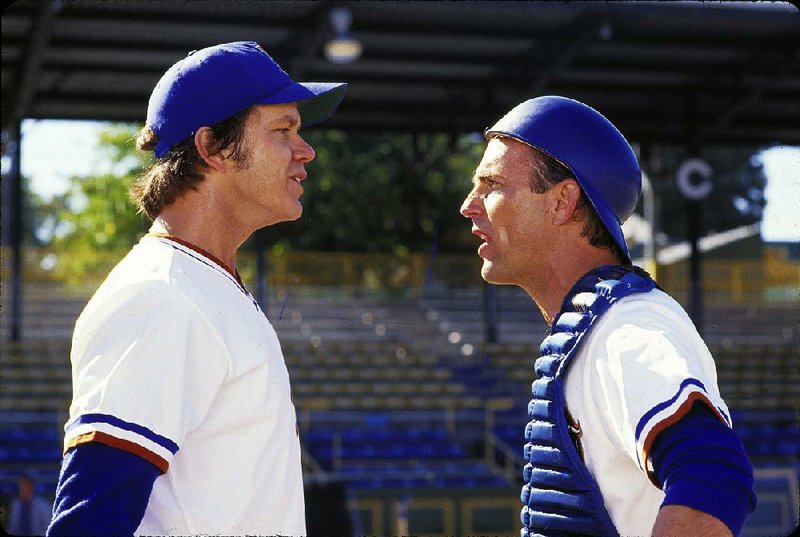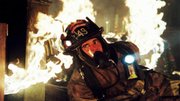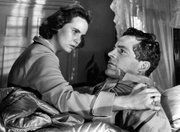You might've noticed: A star-bedazzled movie called The Post has come out, and it's absolute catnip for newspaper reporters -- prompting fact checks, essays and lists of the greatest movies about journalism.
But what does Hollywood have to offer if you're a firefighter? A farmer? A world-class surgeon? We polled experts in careers from A to Z, debated a few wild cards (how does one process a barber's sheepish defense of Adam Sandler's hair salon-theme You Don't Mess With the Zohan?) and came up with a list. Here, as described by the experts themselves, are the best profession-based movies.
(Interviews have been condensed and edited for clarity.)
Astronaut: The Martian (2015)
Charles F. Bolden, former administrator of NASA
Most people think about astronaut movies and they want to talk about The Right Stuff. But The Martian is just so scientifically accurate, and it tells this story of what we're on the cusp of -- not just Americans, humanity. We're not growing potatoes yet on the International Space Station like in the movie, but we're growing lettuce and cherry tomatoes; we're learning how to get to a place and use what's there. The scene where the young kid comes walking into the office of the NASA administrator with a wild and crazy idea that turns out to be the idea that saves Mark Watney -- I love that scene.
Lawyer: My Cousin Vinny (1992)
Robert Spagnoletti, chief executive of the D.C. Bar, former attorney general of the District of Columbia
I will stop and watch this movie whatever I'm doing, and let me tell you why. It shows that everyone involved in the justice system can be really well-intentioned and also be completely fallible. The prosecutor in My Cousin Vinny thinks he has it all figured out, but he doesn't. The witnesses all really believe what they saw, but they're wrong. And then Vinny, although he's completely bumbling, does a very pure direct examination -- and despite everyone's fallibility, the verdict arrives in the right place. It captures the beauty of an adversarial system. And man, when Marisa Tomei is on the stand: "You think I'm hostile now? Wait until you see me tonight."
Bank robber: Heat (1995)
Shon Hopwood, former bank robber, current Georgetown law professor
Robert De Niro, Val Kilmer, Jon Voight and a whole bunch of other characters are a group of professional thieves, and it all leads to a bank robbery and shootout. The big bank robbery scene in downtown L.A. is just sprawling. They must have blocked off half the city. But no heist movies are like real life. They glamorize robbing banks and then 20-year-olds like me in the 1990s watch and think it's a glamorous lifestyle.
Baseball Player: Bull Durham (1988)
Cal Ripken Jr., retired shortstop and third baseman for the Baltimore Orioles, National Baseball Hall of Famer
The screenwriter for Bull Durham, Ron Shelton, played for my dad in the minors. The baseball vernacular at that time was a certain way, like they all called each other "Meat" -- "What's up, Meat? How's it going, Meat?" Shelton put that all in the movie, and watching it takes me back to that time, when I was 10 or 11, listening to all those guys. There's one part I like, an interaction between a veteran catcher and a rookie pitcher. The pitcher keeps shaking off the catchers's advice, so the catcher, Kevin Costner, goes back and tells the batter for the other team what's coming. And that illustrates the reality of baseball: You can have a lot of individual talent, but you have to work with the team to accomplish the goal.
Chef: Eat Drink Man Woman (1994)
Anthony Bourdain, chef, host of Anthony Bourdain: Parts Unknown.
The opening scene of this movie -- about an old banquet chef in Taiwan -- is one of the most extravagantly beautiful and technically impressive cooking scenes, by far. You think he's preparing a high-end banquet for 30 people -- he even slaughters his own chicken -- and then it turns out he's just cooking for his daughters. Nobody in this movie is able to adequately express love; they all do it through food. That's true of so many chefs. Socially inept in every other way, but expressing love through food.
Chess Player: Queen of Katwe (2016)
Garry Kasparov, former world chess champion
First, I insist on distinguishing between movies that are really about chess, of which there are very few, and the countless films that use chess as a prop. For real chess movies, I'd recommend the recent Queen of Katwe, about the girl Phiona Mutesi who discovers chess as an escape from crushing poverty in a Uganda slum. It mostly transcends the usual sports movie tropes, likely because it's a true story about this remarkable young woman. I had the pleasure of meeting her and her coach a few years ago in New York, and the movie does them justice without being too corny.
Cable Guy: The Cable Guy (1996)
Tim Hess, former cable installer
The Cable Guy was an awful movie. Every time I would pull up to a customer's house, they would always say "Cable Guy!" as if it were an original joke. Underneath my breath I would curse Jim Carrey for making that movie. But it's the only movie we have.
Doctor: Something the Lord Made (2004)
Anthony Kalloo, chief of gastroenterology and hepatology at Johns Hopkins Hospital
Vivien Thomas was a minority and an assistant to the head of surgery at Johns Hopkins back in the 1940s. He never made it past high school; he had to enter buildings through the back door. But he was extremely good technically, and he did pioneering research on "blue baby" syndrome. Something the Lord Made is about his work. As a minority myself, and being at Hopkins, I appreciate his challenges of doing fundamental science. And I love the scene when the chief of surgery is struggling a little and insists that Vivien Thomas come into the surgical room to help.
Engineer: No Highway in the Sky (1951)
Bill Nye, mechanical engineer/science guy
Jimmy Stewart's character is an engineer trying to convince the pilot: We're all going to die if you don't land this plane! The tail's going to fall off! It was all about vibration, and what we call metal fatigue, where the load on the part reverses -- that's what makes many metals give up. This is a movie that reminds me of the importance of the work. And the importance of leadership.
Farmer: Charlotte's Web (2006)
Breanna Holbert, student at California State University at Chico, president of National FFA Organization
My brother is 8. He loves this movie and I do, too. There are a lot of small players in the agricultural industry, small farmers, who get overlooked -- but then they end up pushing the big players to move forward, to try and experience new things. Those small players are the Charlottes. We need Charlottes.
Firefighter: Ladder 49 (2004)
Mark Treglio, director of strategic campaigns for the International Association of Firefighters, former Jacksonville fireman
Basically all firefighter movies are misleading for visual effects. Because when you're actually running into a burning building, you can't even see your hand in front of your face; there's too much smoke. But what Ladder 49 gets right -- it's the story of one guy's entire career, told in scenes and flashbacks -- is that firefighters are family. The guys in the firehouse know me better than my wife.
Hairdresser: The Man Who Wasn't There (2001)
Jane Bruner, barber at Hell's Bottom barber shop
It's the Cohen brothers -- it's got Frances McDormand and Billy Bob Thornton. It did a good job showing the relationships between the people you are working next to, and how that can change the scope of your day. As a barber, you spend a lot of time listening to your co-workers' stories, hearing them sharpen what they want to say. Because they have to be able to do it 12 to 16 times a day.
Inventor: Joy (2015)
Elizabeth Dougherty, senior adviser to the undersecretary of the U.S. Patent and Trademark Office
I was really on the fence, and almost chose Back to the Future. But Joy, which is about Joy Mangano's dream to invent a better mop -- it really reflects the real-life struggles of a lot of kitchen-table inventors. We always think of Thomas Edison, Nicola Tesla. But 94 percent of patents are for improvements on objects that already exist. Where would we be without people making better hairbrushes, or toothbrushes, or mops?
Law enforcement: Donnie Brasco (1997)
Peter Newsham, D.C. chief of police
So, I give all new hires the same speech. I say: "I'm going to give you some advice. Everything you've seen on movies about police -- forget it. Those police all shoot up, beat up or blow up the bad guy. None of that is real police. Policing is a service profession." That being said, the one I love is Donnie Brasco, about an undercover agent who gains the trust of one of the biggest crime bosses in New York. It's based on fact, and I just think it's incredible, what this guy was able to accomplish. At the end, Brasco is going to die, and the FBI comes running up, and -- I'm spoiling the ending. You should see the movie.
Librarian: It's a Wonderful Life (1946)
Carla Hayden, librarian of Congress
There's this scene, toward the end, [when Jimmy Stewart sees how miserable his town would be if he didn't exist]. So, for his wife, what's the fate worse than death? She has ugly glasses, and an ugly fedora, and she's ... A LIBRARIAN. I use that scene when I talk about the false stereotypes of librarians. But you know what? It's loving. She definitely would have been OK being a librarian. And the stereotype helps us, too, because it helps people really see us as trustworthy.
Magician: The Dark Knight (2008)
Penn Jillette, magician
You have to be careful when you use the word "magic." The word has two very strong meanings. The meaning I don't care about is anything to do with the supernatural -- so I don't care for movies like The Illusionist, or The Prestige, or Harry Potter. The magic I think is beautiful is the magic of trickery. What I love about Batman is he doesn't have any supernatural powers.
In The Dark Knight, with the Joker and Batman, you really have two magicians running scams. I love the intellectual interest of the boat scene [where there are two boats laden with explosives, and a philosophical debate about who should survive]. When you talk about modern American magic, it's not supernatural, it's the playful study of epistemology. It's how we attain information, and how we attain what is true. In the boat scene, it's: How people perceive morality, coupled with an impossible trick.
The ultimate American magician is Batman.
Military: The Best Years of Our Lives (1946)
Joe Davis, director of public affairs for Veterans of Foreign Wars
I'm a Desert Storm/Somalia veteran, and I came home thinking nobody understood. Well, this movie depicts World War II vets coming home, trying to reimmerse themselves in a civilian society that largely did not understand. There are parallels in every generation of servicemen or women who've gone overseas and come back home. This movie came out in 1946, but it's so true today.
Miner: Matewan (1987)
Phil Smith, director of government affairs for United Mine Workers of America
The story is about miners who decided to organize ... the real life and death struggle it took to make improvements in their lives. My favorite scene is a meeting scene. James Earl Jones stands up with that voice, and makes an argument about how they should be working together and working toward the same goal. Sometimes the most thrilling part of a movie can still just be a speech.
Musician: The Breath Courses Through Us (2013)
Luke Stewart, D.C. musician
It's a documentary about the New York Art Quartet. There's a really beautiful part with [drummer] Milford Graves, and how all the other aspects of his life add to the potency of his music. How, to be a complete artist -- he talks about this in the film -- [means] being very connected to history and various traditions, but also staunchly supporting your own originality.
Nun: The Trouble With Angels (1966)
Sister Rachel Terry of the order Immaculate Heart of Mary, who is a music teacher at Little Flower School in Bethesda, Md.
It took place in a Catholic girls boarding school; Hayley Mills played a firebrand troublemaker, and Rosalind Russell was the mother superior. It doesn't really reflect what my life looks like -- I don't wear a habit, and they do, and they're all living in this huge institution, and I don't -- but the way the sisters interact in that movie is one of the most accurate depictions of how we try to be for mission and with one another. The Hayley Mills character gets a glimpse into the humanity of the sisters, and sees their humanity, their passion, and how they enjoy one another. You see each sister as an individual with a distinct personality.
MovieStyle on 12/29/2017




